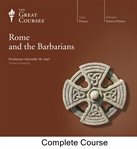Details
PUBLISHED
Made available through hoopla
EDITION
DESCRIPTION
1 online resource (1 audio file (1080 min.)) : digital
ISBN/ISSN
LANGUAGE
NOTES
Read by Kenneth W. Harl
The history of the Romans as they advanced the frontiers of Classical civilization is often told as a story of warfare and conquest - the mighty legions encountering the "barbarians." But this only tells one side of the story. Who were the Celts, Goths, Huns, and Persians met by the Romans as they marched north and east? What were the political, military, and social institutions that made Rome so stable, allowing its power to be wielded against these different cultures for nearly three centuries? What role did those institutions themselves play in assimilating barbarian peoples? These 36 engaging lectures tell the story of the complex relationship between each of these native peoples and their Roman conquerors as they intermarried, exchanged ideas and mores, and, in the ensuing provincial Roman cultures, formed the basis of Western European civilization. You'll study the institutions that made Rome so extraordinary, as well as the extraordinary figures - both Roman and barbarian - whose names have been familiar to us for so long. You'll learn about Augustus, Constantine I, Diocletian, Gaius Julius Caesar, Nero, Attila the Hun, as well as a myriad of figures whose names are less familiar to us. But these lectures deliver far more than personal snapshots, as compelling as those may be. Professor Harl brings to life the institutions that shaped both Rome and her relationship with, and assimilation of, the barbarians at her constantly expanding frontiers. You'll come away with a new appreciation of how our Western world came to be and detailed knowledge about the individuals from royalty to "barbarian" who played key roles in that process
Mode of access: World Wide Web







